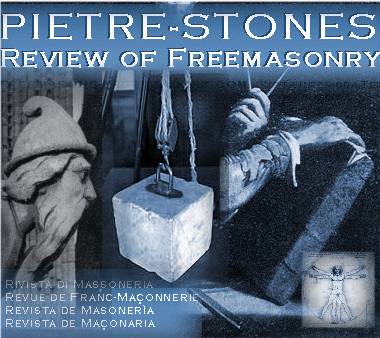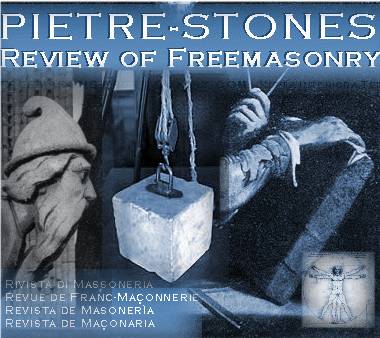
“To steer the barque of life o’er the rough sea of passion without quitting the helm of rectitude is the highest perfection to which human nature can attain”
2nd degree Working Tools
The Craft has often been described as a child of the Enlightenment and although Freemasonry is a product of the Medieval Guilds it was during the Enlightenment that Freemasonry made the transition from being operative to speculative and developed into the organization that we know and love today.
Freemasonry was in many ways a mirror image of the Enlightenment and many of the humanistic values that moved Western civilization forward into modernity can be seen in both. It was in the XVIII century that the feudal structures of the old regime were challenged and at the height of the French Revolution totally dismantled.
Freemasonry adhered to its utopian vision of a perfect society but substituted the sharp blade of the guillotine with the sharper and far more durable power of the word.
Freemasonry must have inherited its ideals of Brotherly love, Relief and Truth- the three principles of the order-from its earlier operative stage but it is clear that they resonate with those defended at the end of the XVIII century by the French revolutionaries: liberte, égalité and fraternité. It is also true that British Freemasonry was admired in continental Europe in an age in which everything British (in particular its institutions) constituted the height of fashion. Parliamentary democracy was a British invention and the forerunner of today’s most widely spread political model: liberal democracy
Regular Freemasonry cannot, by definition, be altered and remains pretty much the same as it was at the height of its popularity in the XVIII and XIX centuries: a frozen image of the values and ideals of the period that informed and in many ways shaped and created it. Browsing through Masonic almanacs from the mid XIX century at Freemason’s Hall I was surprised to read the letters to the editor which were extremely similar to the letters to the editor that one can read presently in magazines such as “Freemasonry Today”. It brought to mind the notion that Freemasonry and Freemasons haven’t changed and that the essence of both remains the same.
Although in practice Freemasonry wasn’t always egalitarian its statutes and rituals are imbued with this desire for democracy and individual freedom. Although we might think that balloting is a prosaic aspect of our initiation ceremony it is charged with meaning and shows commitment to these ideals. The fact that lodge offices are progressive is, of course, another clear example of this innate penchant for egalitarianism that defines the Craft and that must have made it so appealing in XVIII Europe. What was wished for and what was really achieved are two different things, needless to say: the XVIII century, in spite of being described as “The Age of Advancement” was of course a period in which social inequality, poverty and disease were rife by today’s standards but the seeds of change had been planted firmly.
On the other hand regular Freemasonry never went as far as to coincide with the French Revolution in spite of the many nonsensical conspiracy theories that have been circulated to this respect: regular Freemasonry has always required belief in a Supreme Being as a requisite for membership and has thus found a compromise between science and the secularization of society without sacrificing faith and spirituality. The Anderson constitutions make very clear the position of regular Freemasonry in regards to any revolts against the establishment and every Master elect is conjoined to “be a peaceful subject and to abide by the Rules of the Land” as is every Mason reminded to do, in different wording, throughout all three degrees of Craft Freemasonry. Further to this, toasts honouring the Monarch of the country in which the Masonic meeting is taking place are made at the festive board and the local national anthem is also sung at the closure of the lodge. So it is clear that Freemasonry as we understand it never had Revolutionary or even Republican aims and in fact, as all Masons know, Freemasonry has never had a political agenda and discussions of such matters are banned at lodge meetings. At risk of stating the obvious it is fair to say that Freemasonry has always had a cultural agenda and lodge monitors exhort Masons to follow up the study of the Liberal Arts and to improve morally. In this sense describing Freemasonry as a “cultural revolution” that managed to encompass spiritual, moral, social and intellectual values might not be too farfetched but it is important to note that Freemasonry was also, in some ways, a reaction to the Enlightenment. The traditions brought forth from the Guilds, the requisite to believe in a Supreme Being and respect the laws of the land are defining traits of Freemasonry that don’t exactly coincide with the deep seated scepticism of philosophers like David Hume or the Revolutionary ambitions that were rapidly gaining ground throughout Europe.
One of the most defining and appealing traits of Freemasonry is its religious and political tolerance expressed in a formal prohibition to discuss such matters at lodge meetings but more positively in the religious, social and ideological plurality present at many lodges in which Christians of various denominations fraternise with Muslims, Sikhs, Hindis and Buddhists. The British Empire and colonialism as a whole were the medium in which Freemasonry was able to spread and one only has to read Kipling’s poem “My Mother Lodge” to realize how multicultural some lodges must have been in the XIX century and indeed before. These colonial lodges exposed Europeans and non-Europeans to each other’s culture and thus to a deeper knowledge of the human condition.
Freemasonry was, at its inception -and I refer to its historical inception rather than at its mystical and ancient one-a bridge between the Middle Ages to which the Enlightenment was in part a reaction, a Hegelian antithesis, and to modernity itself. Rather paradoxically, Freemasonry could also be seen as a reaction to modernity and rationalism: its links with the occult, its symbolical foundation myths that are too often taken as literal truths and in its supposed connections to Egypt and the Ancient world contributed to the creation of a vast body of Masonic esoteric and occult mythologies still current today.
Of course, ideals like democracy, freedom and equality are old hat today. Many people don’t vote at general elections and are even less likely to celebrate the “Cult of the Enlightenment” in a Masonic lodge. Enlightenment and the subsequent paradigms that it produced are being questioned today by certain forms of authoritarian Democracy and religious fundamentalism, the most visible and tangible opposition to the West’s Liberal Democracies. The philosopher Francis Fukuyama’s assertion that liberal democracy is the last political system we will have in the world might be true but it is also necessary that carelessness and the excesses of consumer society, materialism and technocracy don’t challenge this and more importantly that we don’t return to a new Dark Age.
From being advocates and creators of modernity, freedom and scientific progress, freemasons have now become in the eyes of the educated and well informed public a reactionary, conservative and elitist organization. This is one of those capricious paradoxes that history sometimes throws at us and it doesn’t cease to surprise one how yesterday’s reformers are today’s reactionaries. But is Freemasonry still relevant ideologically, intellectually and philosophically in a postmodern world? I personally believe that Freemasonry is more relevant than ever: democracy, freedom and equality are values that we should never lose or take for granted and that are worth being reminded of. Freemasonry is an ongoing celebration of these values and has the potential to give us all a common identity regardless of status, color or religious background; it has the ability to unite men in the midst of a divided, fragmented society towards a common goal: self-improvement and by extension, social and universal improvement.
And of course the spiritual side of Freemasonry cannot be underestimated in spite of the fact that many Freemasons don’t consider their Masonic interests as being spiritual: Freemasonry’s allegories depict man’s relationship with himself but ,also, in higher degrees, their relationship with the Godhead.
In “The Divine Comedy” Dante and Virgil face obstacles on their way through the seven circles of Hell, some of which symbolize the shortcomings of Humanism too self reliant to allow for metaphysical explorations. Freemasonry promotes humanistic values and simultaneously, invites us to explore our relationship with God and with the Divine and thus offers us a bridge between the material and the spiritual. In this sense, Freemasonry contains within its teachings and rituals the trajectory of Western’s history: from its early operative, medieval days to its modern, Enlightened stage assimilating Spirituality with Reason without sacrificing the essence of neither. Freemasonry is, in this sense, a blue print for the achievements of civilization over barbarism, of art and culture above philistine anti-intellectualism and as such worthy of our dedication.

